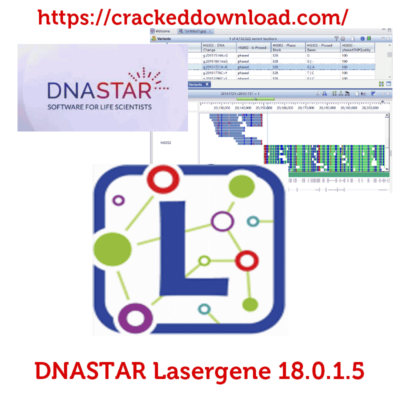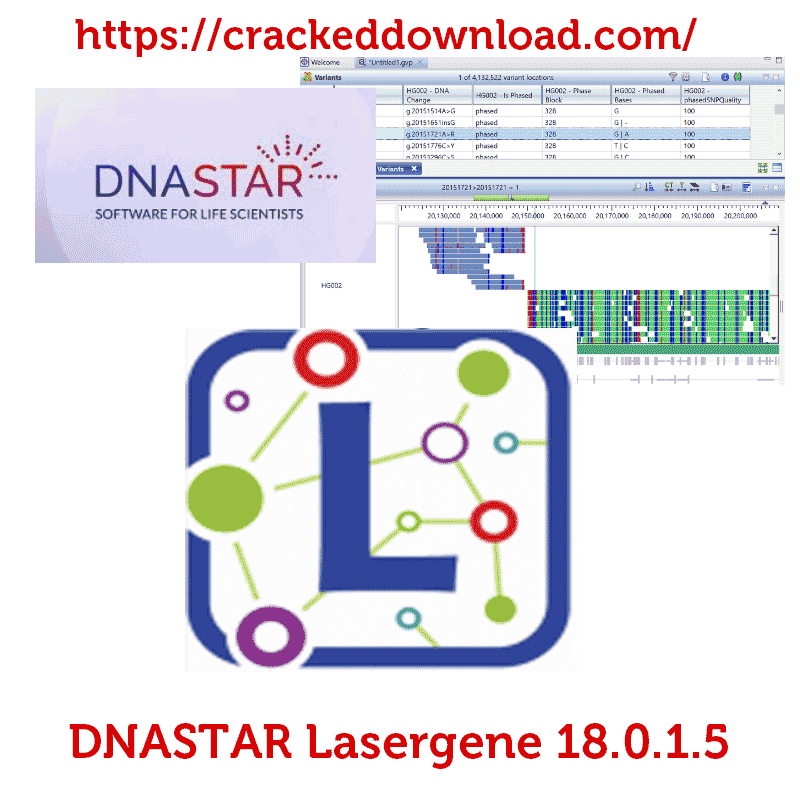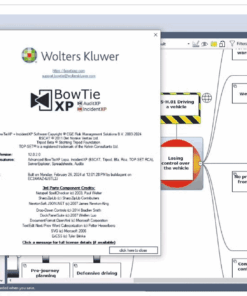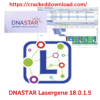DNASTAR Lasergene 18.0.1.5
€0.00
DNASTAR Lasergene 18.0.1.5 full cracked download unlimited
DNASTAR Lasergene 18.0.1.5 is a comprehensive suite of bioinformatics software tools designed to support molecular biologists, geneticists, and researchers in various aspects of DNA, RNA, and protein sequence analysis.
DNASTAR Lasergene 18.0.1.5 full cracked download unlimited
DNASTAR Lasergene 18.0.1.5 is a comprehensive suite of bioinformatics software tools designed to support molecular biologists, geneticists, and researchers in various aspects of DNA, RNA, and protein sequence analysis. Developed by DNASTAR, Inc., Lasergene has been a widely used platform for decades due to its user-friendly interface, robust algorithms, and versatility in handling diverse biological data.

Below is an overview of Lasergene 18.0.1.5 , its features, applications, and system requirements:
Key Features of DNASTAR Lasergene 18.0.1.5
1. Sequence Assembly and Analysis
- SeqMan Ultra:
- Assembles Sanger sequencing data, NGS reads (Illumina, PacBio, Oxford Nanopore), and hybrid datasets.
- Handles large genomes, transcriptomes, and metagenomic data with high accuracy.
- Provides tools for gap closure, variant calling, and genome annotation.
- SeqMan Pro:
- Focuses on smaller-scale assemblies, such as single-gene or targeted sequencing projects.
- Supports alignment of sequences from multiple samples for comparative analysis.
2. Gene Editing and CRISPR Design
- SeqBuilder Pro:
- Allows users to design CRISPR/Cas9 guide RNAs and evaluate potential off-target effects.
- Supports primer design for gene editing experiments.
- Facilitates cloning workflows, including restriction enzyme digestion, ligation, and Gibson assembly.
3. Protein Sequence Analysis
- Protean 3D:
- Analyzes protein structures and predicts functional domains, secondary structures, and physicochemical properties.
- Integrates with databases like UniProt and PDB (Protein Data Bank) for structural visualization.
- NovaFold:
- Predicts protein tertiary structures using ab initio modeling and threading algorithms.
- Useful for studying proteins with unknown structures.
4. Comparative Genomics
- MegAlign Pro:
- Performs multiple sequence alignments using algorithms like Clustal Omega, MAFFT, and MUSCLE.
- Generates phylogenetic trees to study evolutionary relationships.
- Visualizes SNPs, indels, and other variations across sequences.
5. Variant Calling and Annotation
- Identifies SNPs, insertions, deletions, and structural variations from NGS data.
- Annotates variants using public databases (e.g., dbSNP, COSMIC, ClinVar).
- Filters and prioritizes variants based on functional impact and clinical relevance.
6. Transcriptome Analysis
- Analyzes RNA-Seq data to identify differentially expressed genes and splice variants.
- Provides tools for pathway analysis and functional enrichment.
7. Visualization Tools
- Interactive genome browsers for exploring assemblies, annotations, and variants.
- Heatmaps, dot plots, and circular genome maps for visualizing genomic features.
8. Data Integration
- Imports data from various platforms, including Illumina, PacBio, Oxford Nanopore, and ABI sequencers.
- Exports results in multiple formats for downstream analysis or publication.
9. Cloud-Based Options
- Lasergene integrates with DNASTAR’s cloud-based platform, SeqNinja, for scalable computing and collaboration.
Applications of DNASTAR Lasergene 18.0.1.5
- Genome Assembly and Annotation:
- Assembling de novo genomes or resequencing projects.
- Annotating genes, regulatory regions, and non-coding elements.
- Gene Editing and Synthetic Biology:
- Designing CRISPR experiments and validating edits.
- Planning cloning strategies for synthetic biology projects.
- Cancer Genomics:
- Identifying somatic mutations and structural variations in tumors.
- Comparing tumor-normal pairs to detect driver mutations.
- Microbial Genomics:
- Assembling bacterial, viral, and fungal genomes.
- Studying antimicrobial resistance and virulence factors.
- Pharmacogenomics:
- Investigating genetic variants that influence drug response.
- Supporting precision medicine initiatives.
- Evolutionary Biology:
- Constructing phylogenetic trees to study evolutionary relationships.
- Analyzing conserved and divergent regions across species.
- Transcriptomics:
- Profiling gene expression patterns under different conditions.
- Identifying novel transcripts and alternative splicing events.
System Requirements
To run DNASTAR Lasergene 18.0.1.5 effectively, the following system specifications are recommended:
- Operating System:
- Windows 10/11 (64-bit).
- macOS (specific versions supported; check DNASTAR documentation for details).
- Processor:
- Multi-core CPU (Intel i5/i7 or equivalent AMD processor).
- RAM:
- Minimum 8 GB (16 GB or more recommended for large datasets).
- Storage:
- SSD with sufficient space for input/output files (at least 20 GB free space).
- Graphics Card:
- Modern GPU for smooth visualization (optional but recommended).
- Internet Connection:
- Required for software activation and updates.
Licensing and Availability
DNASTAR Lasergene 18.0.1.5 is a commercial software suite. Licenses can be purchased directly from DNASTAR, Inc., or authorized distributors. Licensing options include:
- Perpetual Licenses: One-time purchase with optional annual maintenance plans.
- Subscription Licenses: Pay-as-you-go model for short-term use.
- Academic Discounts: Special pricing for universities and research institutions.
Advantages of DNASTAR Lasergene
- User-Friendly Interface: Intuitive GUI makes it accessible to both beginners and experienced researchers.
- Versatility: Handles a wide range of data types and applications.
- Integration: Combines multiple tools into a single platform, streamlining workflows.
- Scalability: Suitable for small-scale projects as well as large-scale genomics studies.
DNASTAR Lasergene 18.0.1.5 is a powerful and versatile bioinformatics suite that supports a wide array of genomic, transcriptomic, and proteomic analyses. Its robust algorithms, seamless integration of tools, and ease of use make it a valuable resource for researchers in academia, industry, and clinical settings
Related products
Simulation
Uncategorized
chemistry software
unlimited find
Mining Industry
unlimited find
Uncategorized
Uncategorized
Uncategorized
Science Research
engineering softwares
Uncategorized
Uncategorized
Uncategorized
engineering softwares
Geology
Uncategorized
engineering softwares
Uncategorized
Uncategorized
Science Research
Uncategorized
Uncategorized
Uncategorized
Mathematical
Uncategorized
Uncategorized
Uncategorized
Uncategorized
Science Research
Uncategorized
Uncategorized
unlimited find
Biomedical
Dental Software
Science Research
Uncategorized
Science Research
Uncategorized
Uncategorized
unlimited find
scientific software
Uncategorized
















































